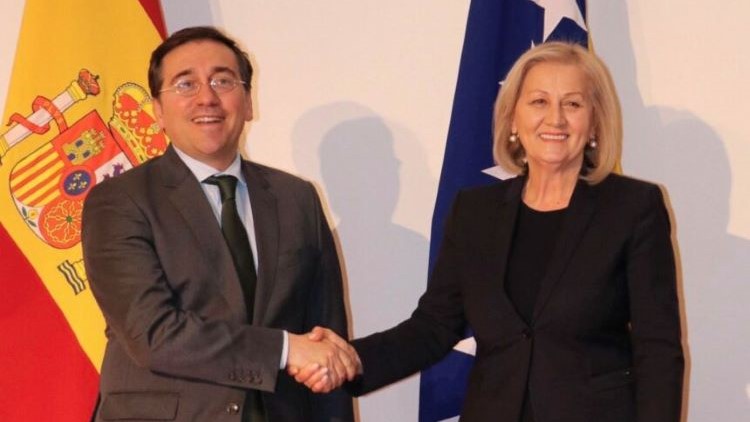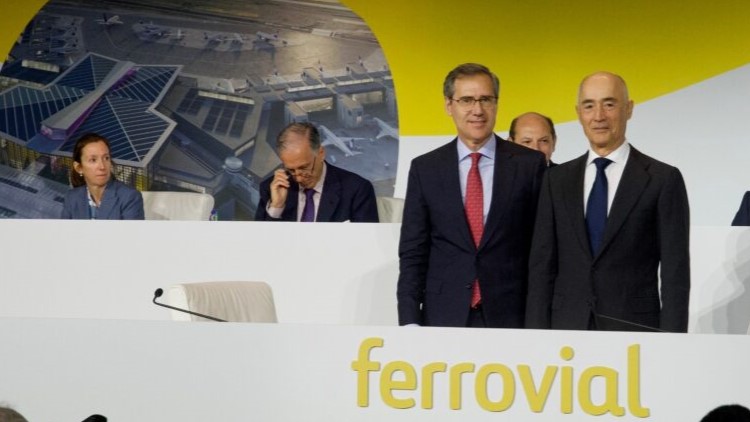Eduardo González
The Minister of Foreign Affairs, José Manuel Albares, yesterday made the second day of his tour of the Western Balkans, where he was received in Belgrade by the President of the Republic and by his Serbian counterpart and discussed in Sarajevo with the authorities of Bosnia and Herzegovina the process of European integration of this country and the role of the Spanish Presidency of the EU in this regard.
Albares was received in Sarajevo by the President of the Council of Ministers of Bosnia and Herzegovina, Borjana Kristo, who declared during the meeting – as reported by the local press – that “bilateral relations are good and friendly, but there is room for improving cooperation, especially economic cooperation”. Therefore, she expressed her “conviction” that economic cooperation will improve in the future and expressed her “special gratitude” to Spain for its “continuous and firm support” to the processes of Bosnia’s integration into the EU.
Likewise, Kristo stressed the importance of Albares’ visit to Bosnia and Herzegovina “before the beginning of the Spanish Presidency of the Council of the European Union”, which, he assured, “is a strong stimulus for the continuation of the reform processes and the progress towards the EU”. In this sense, she emphasized the “unquestionable commitment of Bosnia and Herzegovina to the European path” and stressed that the priority of the Council of Ministers is “the fulfillment of the 14 key priorities of the EC Opinion, the respect of all democratic values and the harmonization with the EU acquis”.
For his part, Albares stressed “the unquestionable support of Spain to the integration processes” of Bosnia and warned of the need to strengthen cultural, political and economic relations at the bilateral level. He also assured that Bosnia and Herzegovina and the Western Balkans as a whole will continue to be, during the EU Presidency, “the center of the Spanish European policy in the context of the enlargement process”.
Bosnia and Herzegovina applied for EU membership in February 2016 and obtained the status of an EU candidate country in December 2022, on condition that it took the recommended measures to strengthen the rule of law, the fight against corruption and organized crime, migration management and fundamental rights.
Apart from that, Albares toured the center of Sarajevo, accompanied by the mayor, Benjamina Karic, and visited the National Library, rebuilt by the Spanish Cooperation. “A city that symbolizes tolerance and coexistence, where cultures meet. A place that reminds us of the importance of promoting European values and defending peace. So that barbarism never triumphs,” the minister stated on his Twitter account.
He also held a meeting with the Minister of Foreign Affairs, Elmedin Konakovic, and signed a Memorandum of Understanding (MoU) to strengthen collaboration in the European integration process, similar to the one signed the day before with Serbia and the one he will sign today in the other two countries of the Balkan tour, Albania and North Macedonia. Albares’ trip coincided with the presence in Madrid of the President of the Parliamentary Assembly of Bosnia and Herzegovina, Denis Zvizdic, who visited the Congress of Deputies and met with its President, Meritxell Batet.
At the press conference following his meeting with Konakovic, Albares congratulated Bosnia for the formation of the new central government after the elections last October and for “its firm commitment to the EU agenda” and assured that Spain will work, during the Presidency of the EU Council, “on enlargement, promoting and accompanying the reform of the aspiring countries”.
Serbia
Yesterday began in Belgrade, one day after being received in the city by the Prime Minister of Serbia, Ana Brnabic, and signing the aforementioned MoU with the Minister of European Integration, Tanja Miscevic.
Albares was received yesterday by the President of Serbia, Aleksandar Vucic, and by the Deputy Prime Minister and Minister of Foreign Affairs of Serbia, Ivica Dacic. During their meeting, Vucic expressed “the sincere commitment of Serbia and Spain to respect international law and mutual support with regard to the territorial integrity and sovereignty of the two states” and, in this regard, “expressed his gratitude to Spain for its principled position of not recognizing the unilateral independence of Kosovo and the active support it provides to Serbia in international fora”.
For his part, Dacic also thanked Spain’s “firm position” “regarding the principles of preservation of sovereignty and integrity,” the Serbian government reported. “When we talk about Kosovo and Metohija, we are talking not only from the point of view of our interests, but also from the point of view of respect for the universal principles of international law” and, therefore, “Spain’s attitude is of great importance for Serbia,” he stated. He also assured that “Serbia also supports the integrity and sovereignty of Spain in the face of separatist movements that are also trying to achieve their goals through unilateral acts”.
Albares, for his part, stated that the main topics of discussion were the bilateral relations between the two countries, the dialogue between Belgrade and Pristina and the ways to bring the Western Balkans closer to the European Union and assured that “the Western Balkans can count on Spain during its Presidency of the EU”. The minister also visited yesterday the Cervantes Institute center in Belgrade, the only one in the Balkan region, which “plays a fundamental role in improving our cultural exchanges and increasing interest in Spanish,” he said via Twitter.
Today, the minister will travel to Tirana (Albania), where he will sign the same cooperation agreement with his colleague Olta Xhaçka, and will later move to Skopje, where he will formalize another memorandum of understanding similar to that of the three previous countries with his counterpart, Bujar Osmani, and will hold various institutional meetings with authorities from North Macedonia.







